University Course Reflection: Kolb's Experiential Learning Model
VerifiedAdded on 2023/04/08
|8
|1751
|197
Report
AI Summary
This report reflects on a student's experience during week five, utilizing Kolb's Experiential Learning Model to analyze a team project interaction. The student describes a specific instance where a decision was made without their input, leading to feelings of exclusion and disappointment. The reflection progresses through Kolb's four stages: concrete experience, reflective observation, abstract conceptualization, and active experimentation. The student identifies the lack of transparency and effective leadership as key issues. Through reflective observation, the student recognizes biases and the need for improved interpersonal skills within the team. The abstract conceptualization phase leads to an understanding of the team leader's role and the importance of conflict resolution. Finally, the student outlines an active experimentation plan to address these issues, including improved communication and conflict resolution strategies for future team interactions. The report concludes with the importance of work-based learning and Kolb’s model for evaluating such experiences, emphasizing the student's commitment to applying these lessons in future teamwork scenarios.
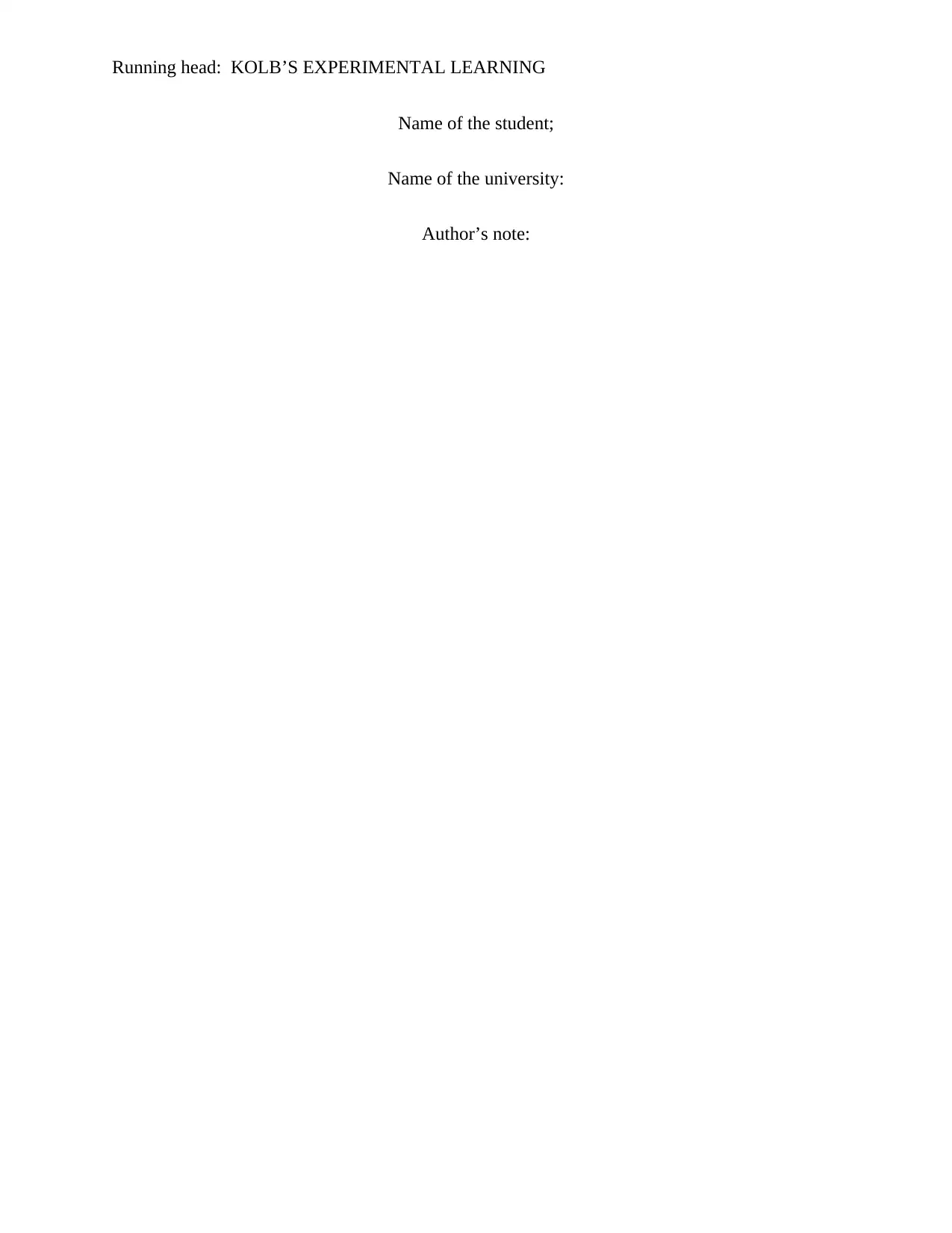
Running head: KOLB’S EXPERIMENTAL LEARNING
Name of the student;
Name of the university:
Author’s note:
Name of the student;
Name of the university:
Author’s note:
Paraphrase This Document
Need a fresh take? Get an instant paraphrase of this document with our AI Paraphraser
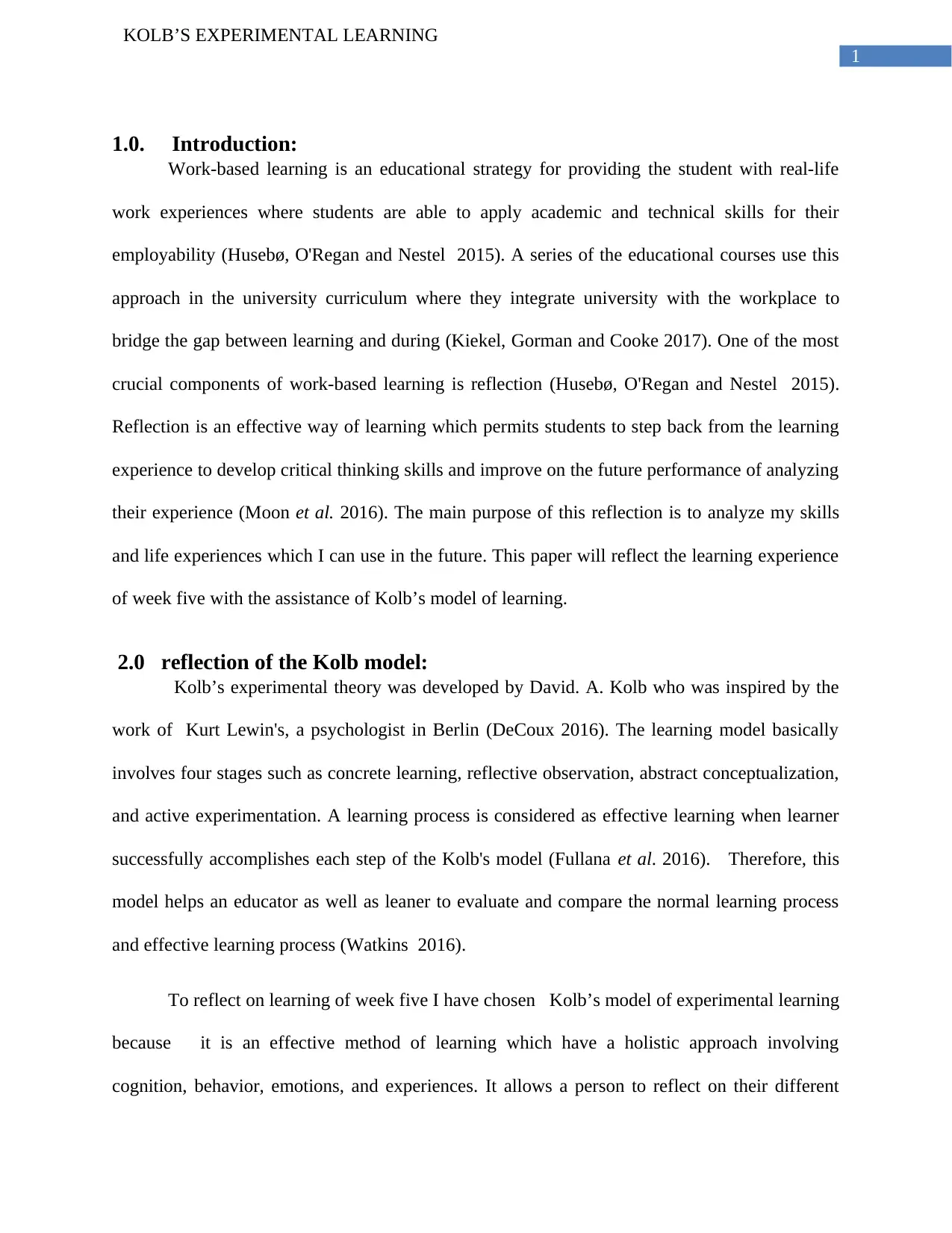
1
KOLB’S EXPERIMENTAL LEARNING
1.0. Introduction:
Work-based learning is an educational strategy for providing the student with real-life
work experiences where students are able to apply academic and technical skills for their
employability (Husebø, O'Regan and Nestel 2015). A series of the educational courses use this
approach in the university curriculum where they integrate university with the workplace to
bridge the gap between learning and during (Kiekel, Gorman and Cooke 2017). One of the most
crucial components of work-based learning is reflection (Husebø, O'Regan and Nestel 2015).
Reflection is an effective way of learning which permits students to step back from the learning
experience to develop critical thinking skills and improve on the future performance of analyzing
their experience (Moon et al. 2016). The main purpose of this reflection is to analyze my skills
and life experiences which I can use in the future. This paper will reflect the learning experience
of week five with the assistance of Kolb’s model of learning.
2.0 reflection of the Kolb model:
Kolb’s experimental theory was developed by David. A. Kolb who was inspired by the
work of Kurt Lewin's, a psychologist in Berlin (DeCoux 2016). The learning model basically
involves four stages such as concrete learning, reflective observation, abstract conceptualization,
and active experimentation. A learning process is considered as effective learning when learner
successfully accomplishes each step of the Kolb's model (Fullana et al. 2016). Therefore, this
model helps an educator as well as leaner to evaluate and compare the normal learning process
and effective learning process (Watkins 2016).
To reflect on learning of week five I have chosen Kolb’s model of experimental learning
because it is an effective method of learning which have a holistic approach involving
cognition, behavior, emotions, and experiences. It allows a person to reflect on their different
KOLB’S EXPERIMENTAL LEARNING
1.0. Introduction:
Work-based learning is an educational strategy for providing the student with real-life
work experiences where students are able to apply academic and technical skills for their
employability (Husebø, O'Regan and Nestel 2015). A series of the educational courses use this
approach in the university curriculum where they integrate university with the workplace to
bridge the gap between learning and during (Kiekel, Gorman and Cooke 2017). One of the most
crucial components of work-based learning is reflection (Husebø, O'Regan and Nestel 2015).
Reflection is an effective way of learning which permits students to step back from the learning
experience to develop critical thinking skills and improve on the future performance of analyzing
their experience (Moon et al. 2016). The main purpose of this reflection is to analyze my skills
and life experiences which I can use in the future. This paper will reflect the learning experience
of week five with the assistance of Kolb’s model of learning.
2.0 reflection of the Kolb model:
Kolb’s experimental theory was developed by David. A. Kolb who was inspired by the
work of Kurt Lewin's, a psychologist in Berlin (DeCoux 2016). The learning model basically
involves four stages such as concrete learning, reflective observation, abstract conceptualization,
and active experimentation. A learning process is considered as effective learning when learner
successfully accomplishes each step of the Kolb's model (Fullana et al. 2016). Therefore, this
model helps an educator as well as leaner to evaluate and compare the normal learning process
and effective learning process (Watkins 2016).
To reflect on learning of week five I have chosen Kolb’s model of experimental learning
because it is an effective method of learning which have a holistic approach involving
cognition, behavior, emotions, and experiences. It allows a person to reflect on their different
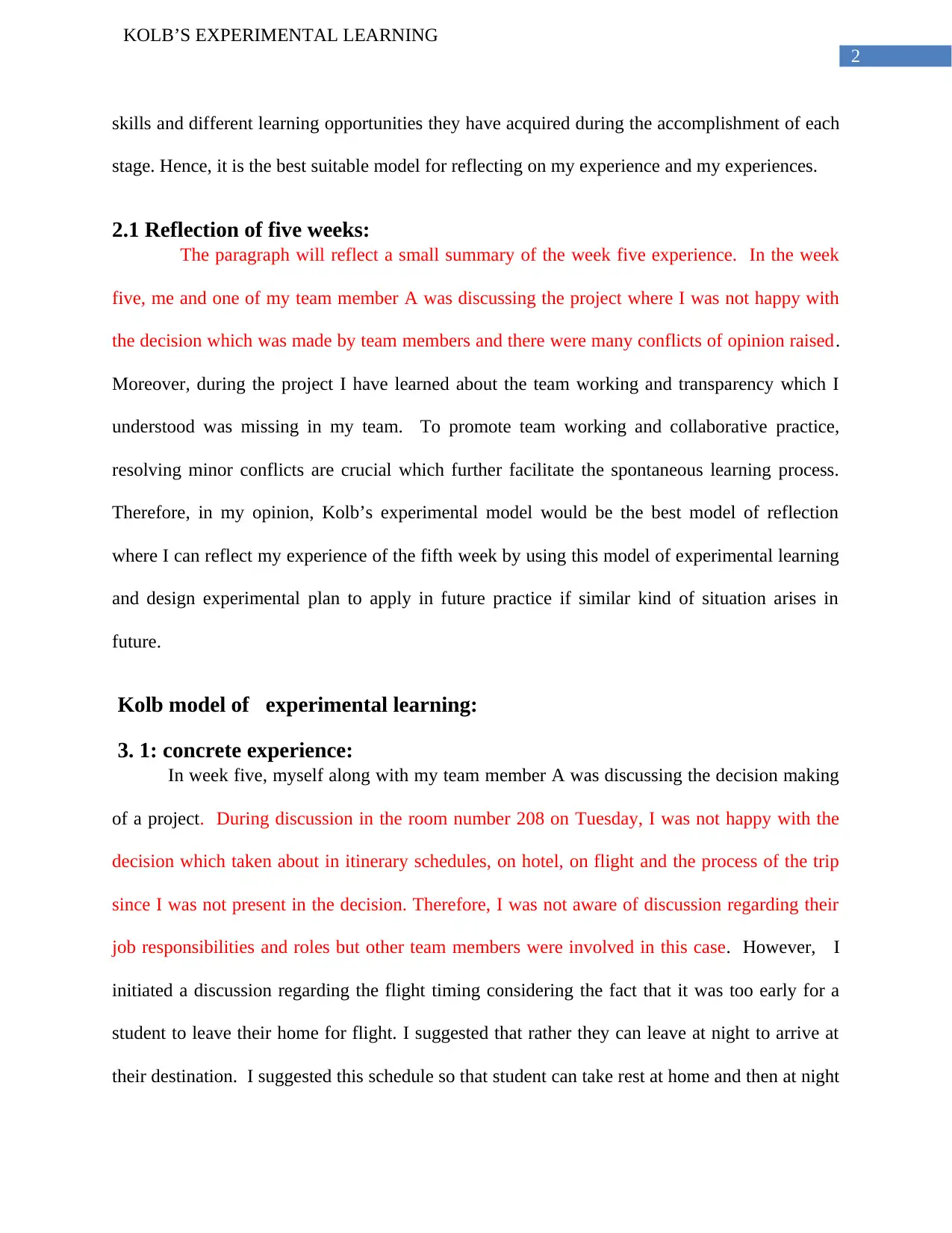
2
KOLB’S EXPERIMENTAL LEARNING
skills and different learning opportunities they have acquired during the accomplishment of each
stage. Hence, it is the best suitable model for reflecting on my experience and my experiences.
2.1 Reflection of five weeks:
The paragraph will reflect a small summary of the week five experience. In the week
five, me and one of my team member A was discussing the project where I was not happy with
the decision which was made by team members and there were many conflicts of opinion raised.
Moreover, during the project I have learned about the team working and transparency which I
understood was missing in my team. To promote team working and collaborative practice,
resolving minor conflicts are crucial which further facilitate the spontaneous learning process.
Therefore, in my opinion, Kolb’s experimental model would be the best model of reflection
where I can reflect my experience of the fifth week by using this model of experimental learning
and design experimental plan to apply in future practice if similar kind of situation arises in
future.
Kolb model of experimental learning:
3. 1: concrete experience:
In week five, myself along with my team member A was discussing the decision making
of a project. During discussion in the room number 208 on Tuesday, I was not happy with the
decision which taken about in itinerary schedules, on hotel, on flight and the process of the trip
since I was not present in the decision. Therefore, I was not aware of discussion regarding their
job responsibilities and roles but other team members were involved in this case. However, I
initiated a discussion regarding the flight timing considering the fact that it was too early for a
student to leave their home for flight. I suggested that rather they can leave at night to arrive at
their destination. I suggested this schedule so that student can take rest at home and then at night
KOLB’S EXPERIMENTAL LEARNING
skills and different learning opportunities they have acquired during the accomplishment of each
stage. Hence, it is the best suitable model for reflecting on my experience and my experiences.
2.1 Reflection of five weeks:
The paragraph will reflect a small summary of the week five experience. In the week
five, me and one of my team member A was discussing the project where I was not happy with
the decision which was made by team members and there were many conflicts of opinion raised.
Moreover, during the project I have learned about the team working and transparency which I
understood was missing in my team. To promote team working and collaborative practice,
resolving minor conflicts are crucial which further facilitate the spontaneous learning process.
Therefore, in my opinion, Kolb’s experimental model would be the best model of reflection
where I can reflect my experience of the fifth week by using this model of experimental learning
and design experimental plan to apply in future practice if similar kind of situation arises in
future.
Kolb model of experimental learning:
3. 1: concrete experience:
In week five, myself along with my team member A was discussing the decision making
of a project. During discussion in the room number 208 on Tuesday, I was not happy with the
decision which taken about in itinerary schedules, on hotel, on flight and the process of the trip
since I was not present in the decision. Therefore, I was not aware of discussion regarding their
job responsibilities and roles but other team members were involved in this case. However, I
initiated a discussion regarding the flight timing considering the fact that it was too early for a
student to leave their home for flight. I suggested that rather they can leave at night to arrive at
their destination. I suggested this schedule so that student can take rest at home and then at night
⊘ This is a preview!⊘
Do you want full access?
Subscribe today to unlock all pages.

Trusted by 1+ million students worldwide
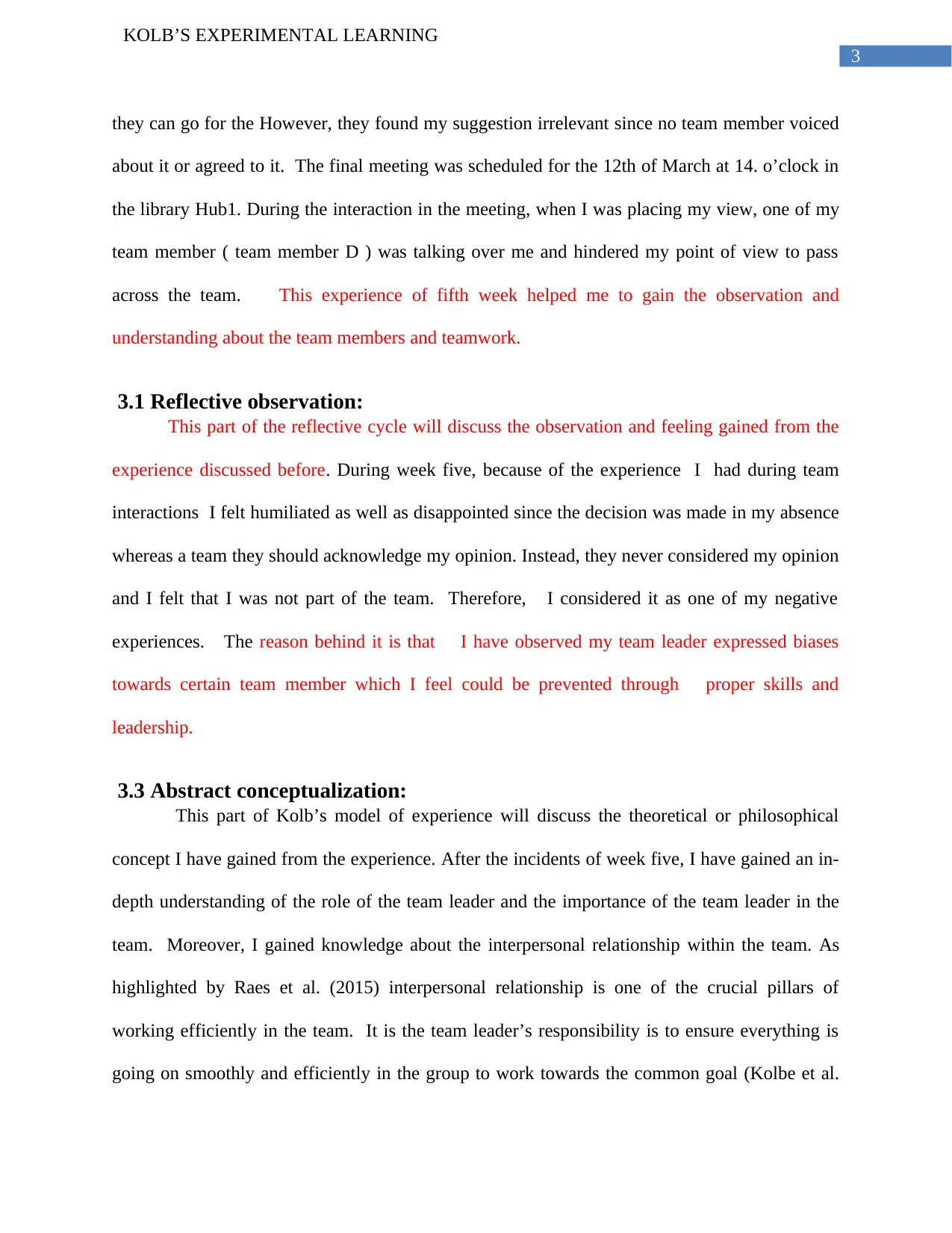
3
KOLB’S EXPERIMENTAL LEARNING
they can go for the However, they found my suggestion irrelevant since no team member voiced
about it or agreed to it. The final meeting was scheduled for the 12th of March at 14. o’clock in
the library Hub1. During the interaction in the meeting, when I was placing my view, one of my
team member ( team member D ) was talking over me and hindered my point of view to pass
across the team. This experience of fifth week helped me to gain the observation and
understanding about the team members and teamwork.
3.1 Reflective observation:
This part of the reflective cycle will discuss the observation and feeling gained from the
experience discussed before. During week five, because of the experience I had during team
interactions I felt humiliated as well as disappointed since the decision was made in my absence
whereas a team they should acknowledge my opinion. Instead, they never considered my opinion
and I felt that I was not part of the team. Therefore, I considered it as one of my negative
experiences. The reason behind it is that I have observed my team leader expressed biases
towards certain team member which I feel could be prevented through proper skills and
leadership.
3.3 Abstract conceptualization:
This part of Kolb’s model of experience will discuss the theoretical or philosophical
concept I have gained from the experience. After the incidents of week five, I have gained an in-
depth understanding of the role of the team leader and the importance of the team leader in the
team. Moreover, I gained knowledge about the interpersonal relationship within the team. As
highlighted by Raes et al. (2015) interpersonal relationship is one of the crucial pillars of
working efficiently in the team. It is the team leader’s responsibility is to ensure everything is
going on smoothly and efficiently in the group to work towards the common goal (Kolbe et al.
KOLB’S EXPERIMENTAL LEARNING
they can go for the However, they found my suggestion irrelevant since no team member voiced
about it or agreed to it. The final meeting was scheduled for the 12th of March at 14. o’clock in
the library Hub1. During the interaction in the meeting, when I was placing my view, one of my
team member ( team member D ) was talking over me and hindered my point of view to pass
across the team. This experience of fifth week helped me to gain the observation and
understanding about the team members and teamwork.
3.1 Reflective observation:
This part of the reflective cycle will discuss the observation and feeling gained from the
experience discussed before. During week five, because of the experience I had during team
interactions I felt humiliated as well as disappointed since the decision was made in my absence
whereas a team they should acknowledge my opinion. Instead, they never considered my opinion
and I felt that I was not part of the team. Therefore, I considered it as one of my negative
experiences. The reason behind it is that I have observed my team leader expressed biases
towards certain team member which I feel could be prevented through proper skills and
leadership.
3.3 Abstract conceptualization:
This part of Kolb’s model of experience will discuss the theoretical or philosophical
concept I have gained from the experience. After the incidents of week five, I have gained an in-
depth understanding of the role of the team leader and the importance of the team leader in the
team. Moreover, I gained knowledge about the interpersonal relationship within the team. As
highlighted by Raes et al. (2015) interpersonal relationship is one of the crucial pillars of
working efficiently in the team. It is the team leader’s responsibility is to ensure everything is
going on smoothly and efficiently in the group to work towards the common goal (Kolbe et al.
Paraphrase This Document
Need a fresh take? Get an instant paraphrase of this document with our AI Paraphraser
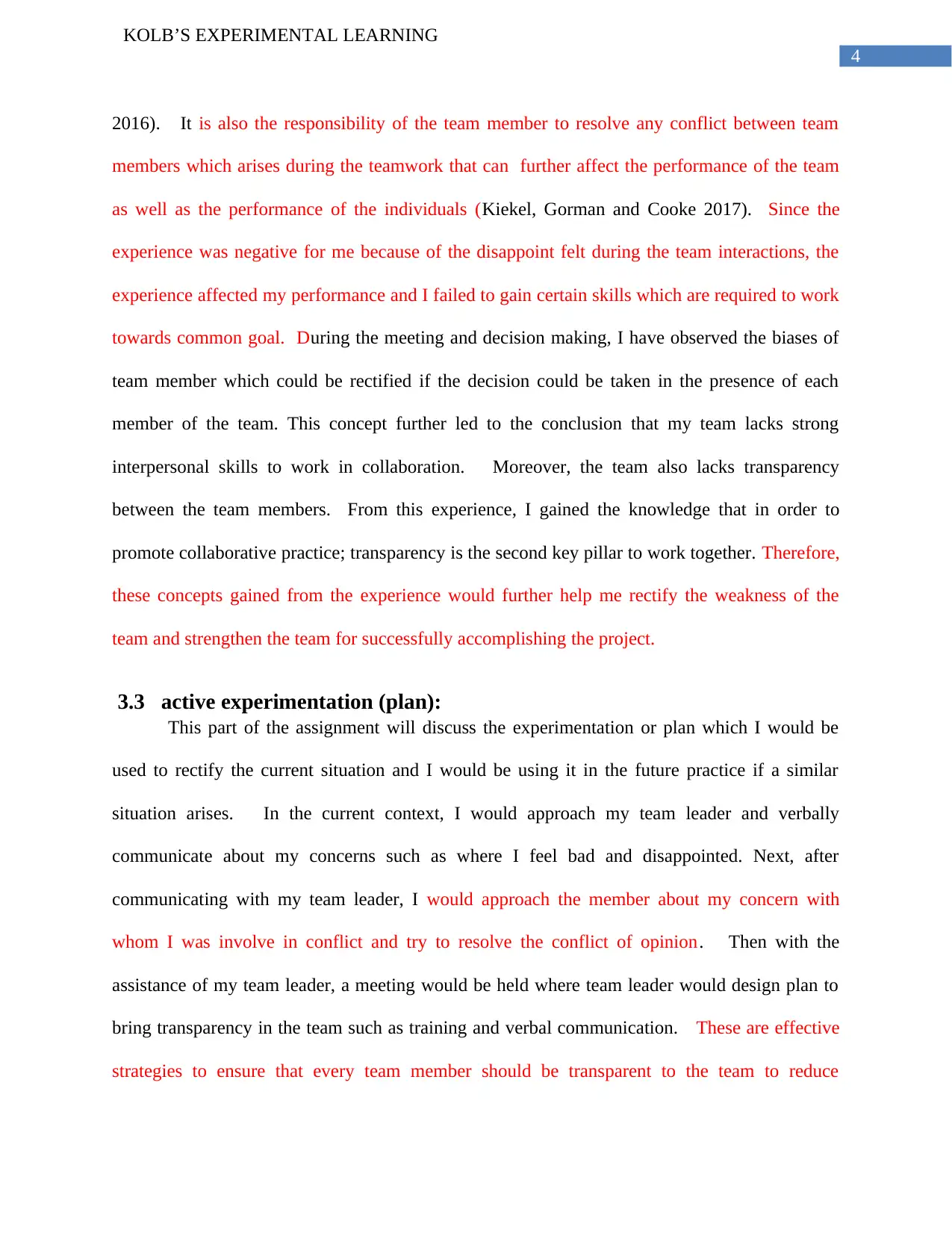
4
KOLB’S EXPERIMENTAL LEARNING
2016). It is also the responsibility of the team member to resolve any conflict between team
members which arises during the teamwork that can further affect the performance of the team
as well as the performance of the individuals (Kiekel, Gorman and Cooke 2017). Since the
experience was negative for me because of the disappoint felt during the team interactions, the
experience affected my performance and I failed to gain certain skills which are required to work
towards common goal. During the meeting and decision making, I have observed the biases of
team member which could be rectified if the decision could be taken in the presence of each
member of the team. This concept further led to the conclusion that my team lacks strong
interpersonal skills to work in collaboration. Moreover, the team also lacks transparency
between the team members. From this experience, I gained the knowledge that in order to
promote collaborative practice; transparency is the second key pillar to work together. Therefore,
these concepts gained from the experience would further help me rectify the weakness of the
team and strengthen the team for successfully accomplishing the project.
3.3 active experimentation (plan):
This part of the assignment will discuss the experimentation or plan which I would be
used to rectify the current situation and I would be using it in the future practice if a similar
situation arises. In the current context, I would approach my team leader and verbally
communicate about my concerns such as where I feel bad and disappointed. Next, after
communicating with my team leader, I would approach the member about my concern with
whom I was involve in conflict and try to resolve the conflict of opinion. Then with the
assistance of my team leader, a meeting would be held where team leader would design plan to
bring transparency in the team such as training and verbal communication. These are effective
strategies to ensure that every team member should be transparent to the team to reduce
KOLB’S EXPERIMENTAL LEARNING
2016). It is also the responsibility of the team member to resolve any conflict between team
members which arises during the teamwork that can further affect the performance of the team
as well as the performance of the individuals (Kiekel, Gorman and Cooke 2017). Since the
experience was negative for me because of the disappoint felt during the team interactions, the
experience affected my performance and I failed to gain certain skills which are required to work
towards common goal. During the meeting and decision making, I have observed the biases of
team member which could be rectified if the decision could be taken in the presence of each
member of the team. This concept further led to the conclusion that my team lacks strong
interpersonal skills to work in collaboration. Moreover, the team also lacks transparency
between the team members. From this experience, I gained the knowledge that in order to
promote collaborative practice; transparency is the second key pillar to work together. Therefore,
these concepts gained from the experience would further help me rectify the weakness of the
team and strengthen the team for successfully accomplishing the project.
3.3 active experimentation (plan):
This part of the assignment will discuss the experimentation or plan which I would be
used to rectify the current situation and I would be using it in the future practice if a similar
situation arises. In the current context, I would approach my team leader and verbally
communicate about my concerns such as where I feel bad and disappointed. Next, after
communicating with my team leader, I would approach the member about my concern with
whom I was involve in conflict and try to resolve the conflict of opinion. Then with the
assistance of my team leader, a meeting would be held where team leader would design plan to
bring transparency in the team such as training and verbal communication. These are effective
strategies to ensure that every team member should be transparent to the team to reduce
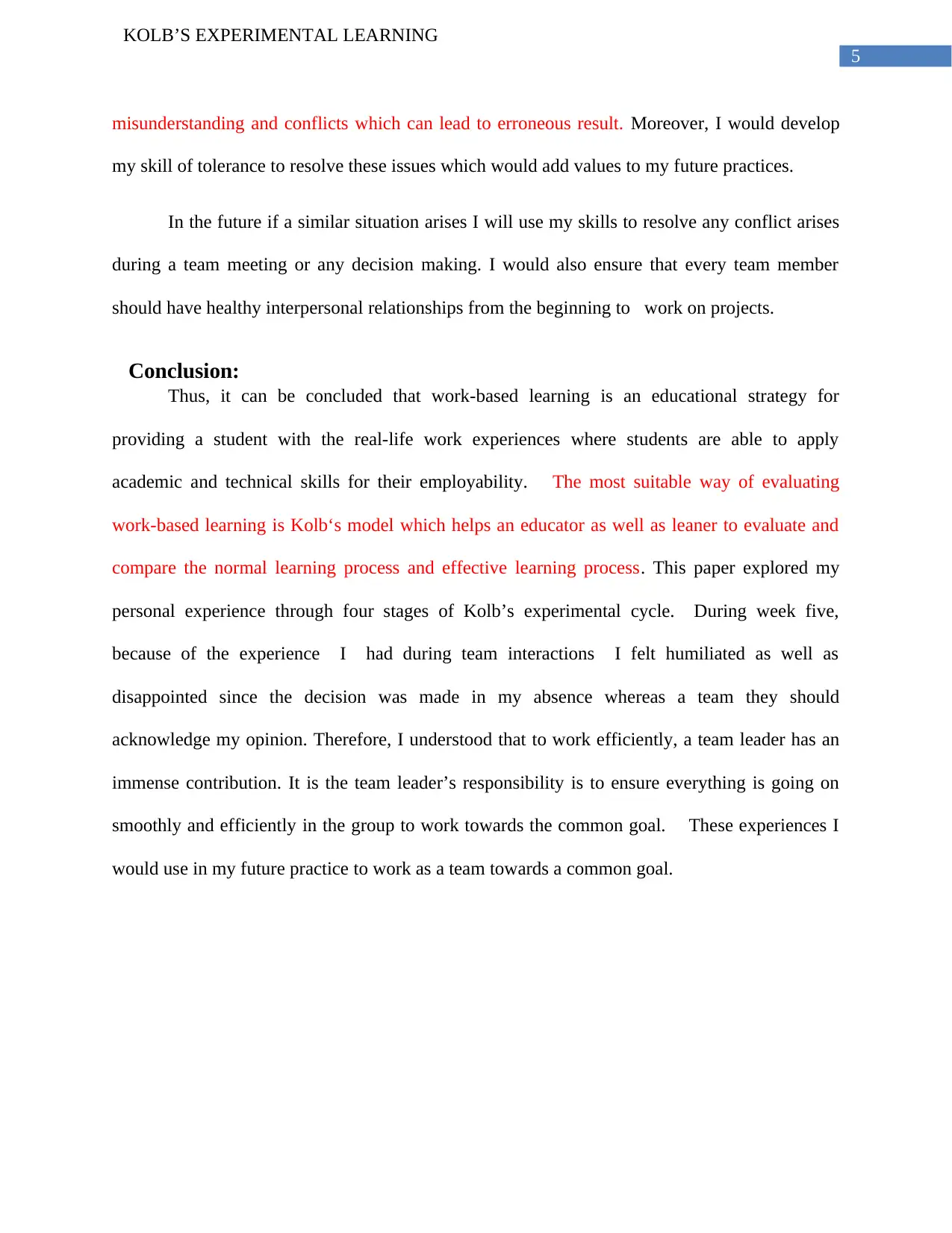
5
KOLB’S EXPERIMENTAL LEARNING
misunderstanding and conflicts which can lead to erroneous result. Moreover, I would develop
my skill of tolerance to resolve these issues which would add values to my future practices.
In the future if a similar situation arises I will use my skills to resolve any conflict arises
during a team meeting or any decision making. I would also ensure that every team member
should have healthy interpersonal relationships from the beginning to work on projects.
Conclusion:
Thus, it can be concluded that work-based learning is an educational strategy for
providing a student with the real-life work experiences where students are able to apply
academic and technical skills for their employability. The most suitable way of evaluating
work-based learning is Kolb‘s model which helps an educator as well as leaner to evaluate and
compare the normal learning process and effective learning process. This paper explored my
personal experience through four stages of Kolb’s experimental cycle. During week five,
because of the experience I had during team interactions I felt humiliated as well as
disappointed since the decision was made in my absence whereas a team they should
acknowledge my opinion. Therefore, I understood that to work efficiently, a team leader has an
immense contribution. It is the team leader’s responsibility is to ensure everything is going on
smoothly and efficiently in the group to work towards the common goal. These experiences I
would use in my future practice to work as a team towards a common goal.
KOLB’S EXPERIMENTAL LEARNING
misunderstanding and conflicts which can lead to erroneous result. Moreover, I would develop
my skill of tolerance to resolve these issues which would add values to my future practices.
In the future if a similar situation arises I will use my skills to resolve any conflict arises
during a team meeting or any decision making. I would also ensure that every team member
should have healthy interpersonal relationships from the beginning to work on projects.
Conclusion:
Thus, it can be concluded that work-based learning is an educational strategy for
providing a student with the real-life work experiences where students are able to apply
academic and technical skills for their employability. The most suitable way of evaluating
work-based learning is Kolb‘s model which helps an educator as well as leaner to evaluate and
compare the normal learning process and effective learning process. This paper explored my
personal experience through four stages of Kolb’s experimental cycle. During week five,
because of the experience I had during team interactions I felt humiliated as well as
disappointed since the decision was made in my absence whereas a team they should
acknowledge my opinion. Therefore, I understood that to work efficiently, a team leader has an
immense contribution. It is the team leader’s responsibility is to ensure everything is going on
smoothly and efficiently in the group to work towards the common goal. These experiences I
would use in my future practice to work as a team towards a common goal.
⊘ This is a preview!⊘
Do you want full access?
Subscribe today to unlock all pages.

Trusted by 1+ million students worldwide
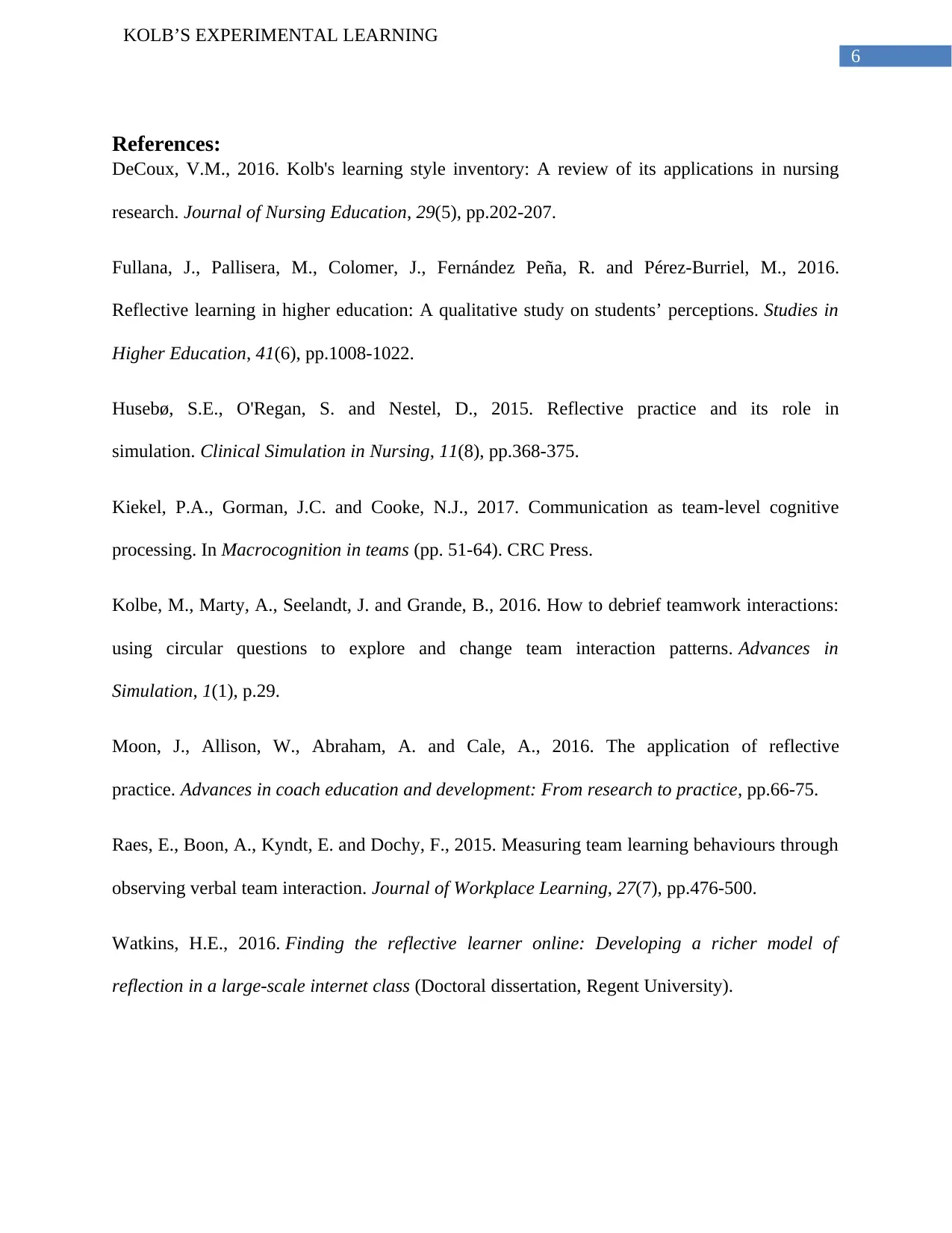
6
KOLB’S EXPERIMENTAL LEARNING
References:
DeCoux, V.M., 2016. Kolb's learning style inventory: A review of its applications in nursing
research. Journal of Nursing Education, 29(5), pp.202-207.
Fullana, J., Pallisera, M., Colomer, J., Fernández Peña, R. and Pérez-Burriel, M., 2016.
Reflective learning in higher education: A qualitative study on students’ perceptions. Studies in
Higher Education, 41(6), pp.1008-1022.
Husebø, S.E., O'Regan, S. and Nestel, D., 2015. Reflective practice and its role in
simulation. Clinical Simulation in Nursing, 11(8), pp.368-375.
Kiekel, P.A., Gorman, J.C. and Cooke, N.J., 2017. Communication as team-level cognitive
processing. In Macrocognition in teams (pp. 51-64). CRC Press.
Kolbe, M., Marty, A., Seelandt, J. and Grande, B., 2016. How to debrief teamwork interactions:
using circular questions to explore and change team interaction patterns. Advances in
Simulation, 1(1), p.29.
Moon, J., Allison, W., Abraham, A. and Cale, A., 2016. The application of reflective
practice. Advances in coach education and development: From research to practice, pp.66-75.
Raes, E., Boon, A., Kyndt, E. and Dochy, F., 2015. Measuring team learning behaviours through
observing verbal team interaction. Journal of Workplace Learning, 27(7), pp.476-500.
Watkins, H.E., 2016. Finding the reflective learner online: Developing a richer model of
reflection in a large-scale internet class (Doctoral dissertation, Regent University).
KOLB’S EXPERIMENTAL LEARNING
References:
DeCoux, V.M., 2016. Kolb's learning style inventory: A review of its applications in nursing
research. Journal of Nursing Education, 29(5), pp.202-207.
Fullana, J., Pallisera, M., Colomer, J., Fernández Peña, R. and Pérez-Burriel, M., 2016.
Reflective learning in higher education: A qualitative study on students’ perceptions. Studies in
Higher Education, 41(6), pp.1008-1022.
Husebø, S.E., O'Regan, S. and Nestel, D., 2015. Reflective practice and its role in
simulation. Clinical Simulation in Nursing, 11(8), pp.368-375.
Kiekel, P.A., Gorman, J.C. and Cooke, N.J., 2017. Communication as team-level cognitive
processing. In Macrocognition in teams (pp. 51-64). CRC Press.
Kolbe, M., Marty, A., Seelandt, J. and Grande, B., 2016. How to debrief teamwork interactions:
using circular questions to explore and change team interaction patterns. Advances in
Simulation, 1(1), p.29.
Moon, J., Allison, W., Abraham, A. and Cale, A., 2016. The application of reflective
practice. Advances in coach education and development: From research to practice, pp.66-75.
Raes, E., Boon, A., Kyndt, E. and Dochy, F., 2015. Measuring team learning behaviours through
observing verbal team interaction. Journal of Workplace Learning, 27(7), pp.476-500.
Watkins, H.E., 2016. Finding the reflective learner online: Developing a richer model of
reflection in a large-scale internet class (Doctoral dissertation, Regent University).
Paraphrase This Document
Need a fresh take? Get an instant paraphrase of this document with our AI Paraphraser
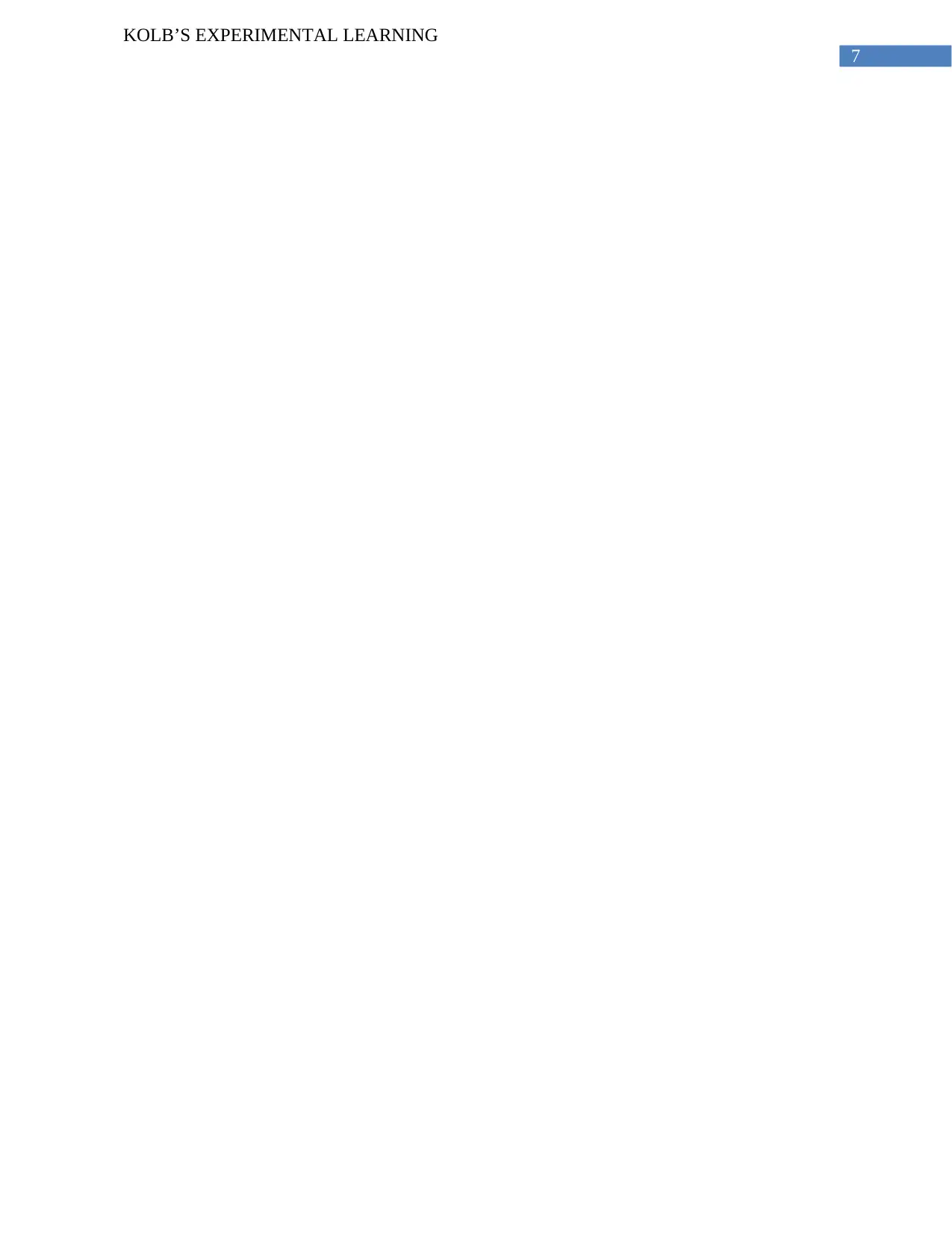
7
KOLB’S EXPERIMENTAL LEARNING
KOLB’S EXPERIMENTAL LEARNING
1 out of 8
Related Documents
Your All-in-One AI-Powered Toolkit for Academic Success.
+13062052269
info@desklib.com
Available 24*7 on WhatsApp / Email
![[object Object]](/_next/static/media/star-bottom.7253800d.svg)
Unlock your academic potential
Copyright © 2020–2026 A2Z Services. All Rights Reserved. Developed and managed by ZUCOL.





